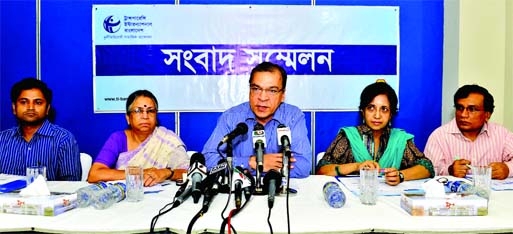
Transparency International Bangladesh [TIB] has raised allegation against the government about lack of transparency in the disbursement process of donation money among the victims of Rana Plaza tragedy.
The anti-graft body has recommended setting up a ‘Garment Sector Governance Authority’ to ensure transparency and accountability during implementation of different initiatives and pledges by the government in the apparel sector.
The recommendation came from a TIB’s follow-up report titled ‘Challenge of Good Governance in the Ready-made Garments Sector: Pledges and Progress’ which was released at a press conference at a city hotel on Monday.
“There is lack of transparency of government in disbursing money among the victims of Rana Plaza tragedy. Even, the procedure of constituting the fund and receiving donations from different quarters is not transparent at all. There is also no information how much money the government has received for the fund,” said Dr Iftekharuzzaman, Executive Director of TIB while speaking at the conference.
Dr Sharif Ahmad Chowdhury and Nazmul Huda Meena, both officials of the TIB, jointly placed the report.
Presided over by Chairperson of TIB Trustee Board Advocate Sultana Kamal, the function was also attended, among others, by its deputy executive director Dr Sumaiya Khaier and director of research and police wing Md Rafiqul Hassan.
The TIB report said the RMG sector did not witness ‘visible and clear’ development due to lack of coordination among the partner organizations in implementing different development projects.
It also said 102 decisions were taken after the deadly collapse of the Rana Plaza that housed five garment industries there. But only 31 per cent of the decisions have so far been implemented, 60 per cent are still under process while 9 per cent remained totally ineffective.
Focusing the importance of coordination among the development partners, the TIB in its report proposed to constitute a separate and full-fledged ministry for the country’s apparel sector.
Besides, it laid emphasis on quick establishment of ‘garment village’ with the participation of apparel buyers and industry owners, and formation of a workers welfare fund.
Apart from it, the TIB proposed the government, buyers and factory owners to take coordinate move to check factory shutdown, firing of workers and cancellation of order in case of failure to implement compliance by any factory.
In its final observation, the TIB said that the RMG workers will be deprived and face security problem, if there is lack of good governance accompanied by corruption.
According to data provided by TIB, about 25 factories have so far been closed following the inspection of foreign buyers where about 50,000 workers have lost their jobs. If the trend continues, over 500,000 workers will be jobless.
On April 24, 2013, Rana Plaza, an eight-story commercial building that housed five apparel factories was collapsed in Savar, which is considered to be the deadliest garment-factory accident in modern human history.
The search for the dead ended on May 13, 2013 with the death toll of 1,129 while about 2,515 injured people were rescued from the building.

